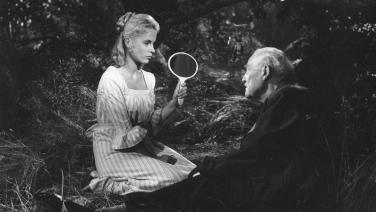
Smultronstället (Wild Strawberries), Ingmar Bergman, Sweden, 1957, 90 min
1957 was Bergman’s greatest year, as we saw in the documentary by Swedish director Jane Magnusson Bergman, Ett Ar, Ett Liv (Bergman, A Year in a Life), screened in the Zabaltegi-Tabakalera competition at the San Sebastián International Film Festival.
The film showed a 38-year-old Bergman during a creative storm and depicted that time as one of the heights of his career. On a restricted diet of savoury crackers on account of a stomach ulcer, and sometimes forced to work from his hospital bed, Bergman nonetheless managed to premier four works in Stockholm’s national theatre, his first series for Swedish TV and two of his cinematic masterpieces: Det sjunde inseglet (The Seventh Seal) and Smultronstället (Wild Strawberries).
The film relates the journey made by ageing Professor Borg from Stockholm to Lund, with his daughter-in-law for company. Dr Borg’s journey is at once a formal and symbolic reflection on the director’s childhood as it is a reflection on memory, the passage of time and the fragility of life. The film had an immediate impact and was hailed as a masterpiece during the year of its release. The work's narrative and visual power is further boosted by a stellar cast. Victor Sjöström made his final appearance on the big screen alongside now-classic names in Bergman's filmography including Bibi Andersson, Ingrid Thulin, Gunnar Björnstrand and Max von Sydow.
Smultronstället (Wild Strawberries) was nominated for an Academy Award for Best Original Screenplay and won the Golden Globe for Best Foreign Language Film and the Golden Bear for Best Film at the Berlin Film Festival.
Smultronstället (Wild Strawberries) was nominated for an Academy Award for Best Original Screenplay and won the Golden Globe for Best Foreign Language Film and the Golden Bear for Best Film at the Berlin Film Festival.
